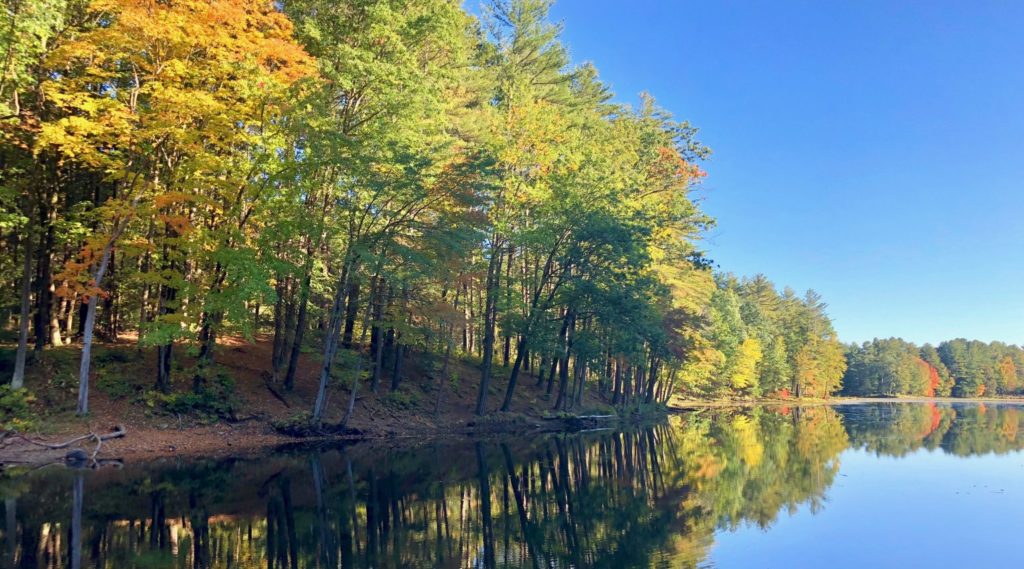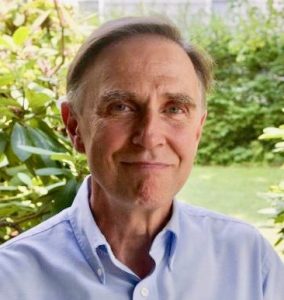Opinion: Seeing Ourselves as a Part of Nature May Be Essential

Cranberry Pond in Western Massachusetts. Photo: Russ Vernon-Jones
Love, Justice And Climate Change

I’ve been interested to learn about the indigenous people on whose land I live in western Massachusetts. As far as I know I don’t have any Indigenous heritage myself. I’ve learned that this area was home to the Nonotuck and the Nipmuc people. Nipmuc people still live in Central and Western Massachusetts and have an elected tribal government.
There is some debate about dates, but indigenous people have lived in what is now called New England since time immemorial. They have continued to be here, despite disease, genocide, and displacement brought by European settler colonizers. (The 2020 U.S. Census found more than 13,000 American Indians living in Massachusetts, although other studies put the number higher. It found that the number of people in the U.S. who identify as Native American and Alaskan Native, alone and in combination with another race, is at least 9.7 million.)
A long history
It struck me that Indigenous people lived in my area for at least many thousands of years without damaging the environment nor creating environmental crises. Clearly they found ways to live in harmony with their environment–ways that allowed humans and the rest of the natural environment to thrive together. Things have gone less well for the environment since the Europeans invaded North America.
In the last century and a half, the global white population in particular, has been living on the Earth in ways that have so damaged the climate that people everywhere are experiencing deadly storms, heat waves, wildfires, droughts, floods, and disruption of agriculture. Parts of the earth are at risk of becoming uninhabitable as a result of our actions. We must find new ways of living on the earth. New renewable energy technologies are an improvement over fossil fuels. However, I believe that in order to succeed in solving the climate crisis we will need to learn from Indigenous people–especially about how to establish a healthier relationship with our planet.
Indigenous Perspectives
Indigenous people have not thought of themselves as separate from the rest of the natural world, but have rather seen themselves as a part of the network of all things living and non-living. They have generally seen the earth as a relative, rather than as something to be dominated. Could we return to this way of thinking about ourselves and all of nature?
Marama Davidson, who leads the Green Party in the New Zealand Parliament, is an Indigenous Maori woman. In her inaugural speech to the Parliament she said, “We are supposed to be connected to each other” and to the earth. “When we are disconnected we create grossly unequal societies” that harm humans and harm the earth.
“Honor the Earth,” a Native initiative in the U.S., sees our current economic, social and political relationships as “based in systems of conquest.” These Indigenous people call for us to move “toward systems based on just relationships with each other and the natural world… [recognizing] our collective humanity and our joint dependence on the Earth.”
Heather Alberro, who is of Cuban ancestry, writes, “To truly bring ourselves into harmony with the natural world, we must return to seeing humanity as part of it.” She explains that prior to the rise of Judeo-Christian values, humans “generally considered the sacred to be found throughout nature, and humanity as thoroughly enmeshed within it.” Judeo-Christian monotheism positioned God outside of nature and the book of Genesis in the Bible taught that God ordered humans to “subdue” the Earth and have “dominion” over it.
Seeing Humans As Separate From Nature
Historian Lynn White argued that these religion-based ideas laid the foundations of modern anthropocentrism, a system of thought that sees humans as separate from, and superior to, the nonhuman world. He saw these attitudes as a fundamental cause of our current environmental crises. Many who share this perspective believe that we must engage not only in technological change, but also in cultural change – fundamentally changing our worldview order to solve the climate crisis.
Some Christian theologians are re-interpreting the Bible passages from Genesis as giving humans responsibility to care for nature rather than dominate it for our selfish purposes.
Seeing Ourselves As A Part Of Nature
I believe that each of us carries a love for the land and for the natural world that we can rediscover and nurture within us. I think we can see ourselves as a part of nature and imagine a world in which we have relationships with each other and with the natural world–kinship relationships characterized by justice, respect, and care. Seeing ourselves as living in the midst of a network of such relationships may be fundamental to our making all the other changes that will be needed to solve the climate crisis.
Other resources:
- Series 5 of the podcast “Scene on Radio” explores these ideas in much greater depth.
- “NDN Collective” provides current events, editorials, and collaborative multimedia — from an Indigenous perspective.
- You may find my posts “News About Indigenous Resistance to Fossil Fuel Projects” and “Connection: A Balm in Troubled Times” interesting and helpful
Russ Vernon-Jones was principal of Fort River School 1990-2008 and is currently a member of the Steering Committee of Climate Action Now-Western Massachusetts. He blogs regularly on climate justice at www.russvernonjones.org.

Russ… just one editorial suggestion. Strike the word “May“ from the title.
The message delivered is valid, but incomplete. Living systems follow two Principles according to many physicists, ecologists, and biologists. The first is not an absolute Law, as I’ve noted two possible exceptions. It is The Maximum Power Principle. This is the tendency to seek energy throughput, to replicate, and to expand niches. The exceptions I propose are suicide and voluntary simplicity, which appear to exist in humans alone. Billions of humans are in INvoluntary simplicity, and are seeking to increase their material well-being. Only a small % of those better off live below their capability. See:
https://www.ecologycenter.us/ecosystem-theory/the-maximum-power-principle.html
The second is The Maximum Entropy Production Principle. This is related, and has been applied to both non-living and living systems. See:
https://pubmed.ncbi.nlm.nih.gov/20368247/
I present these to support the notions that scale is critical in human activity, and that the growth imperative which is destroying our natural habitat is self-destructive. Nature is at work attempting to put us back in balance with the rest of the planet. We’ve quadrupled in the lifespan of living members. Rex Weyler, physicist and co-founder of Greenpeace, and William Rees, developer of Ecological Footprint Analysis both strongly assert that we are in massive numerical overshoot. No matter the attitude transplants that education can help engender, without reversal of population growth, it is highly unlikely to help. Women’s empowerment is critical in that reversal. Many patriarchal cultures are still firmly against that.
Russ, I appreciate your suggestion of Scene On Radio podcast. I will look at Season 5 as you suggest. I also loved Season 2 called “Seeing White” about racism and Season 4 called “The land that never has been yet” about Democracy. An excellent resource, John Biewan and his colleagues do a wonderful job of fleshing out these difficult structural issues.